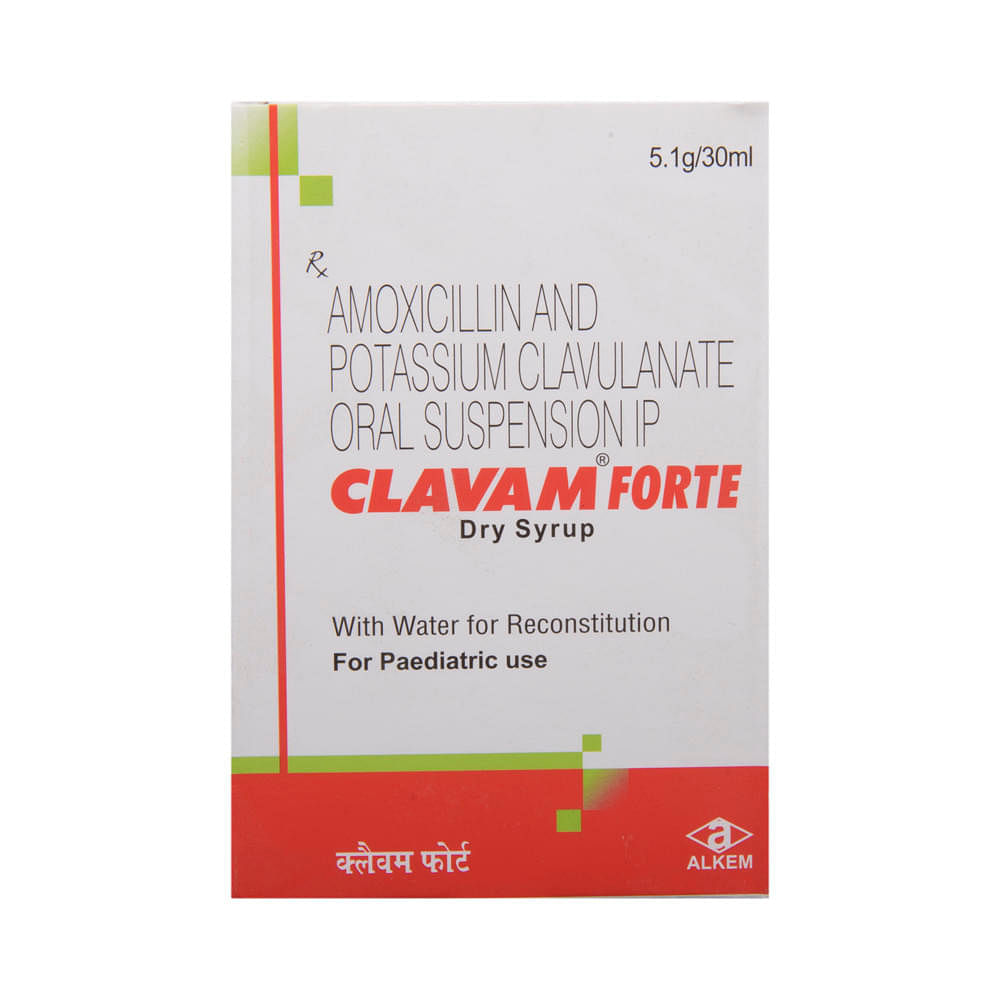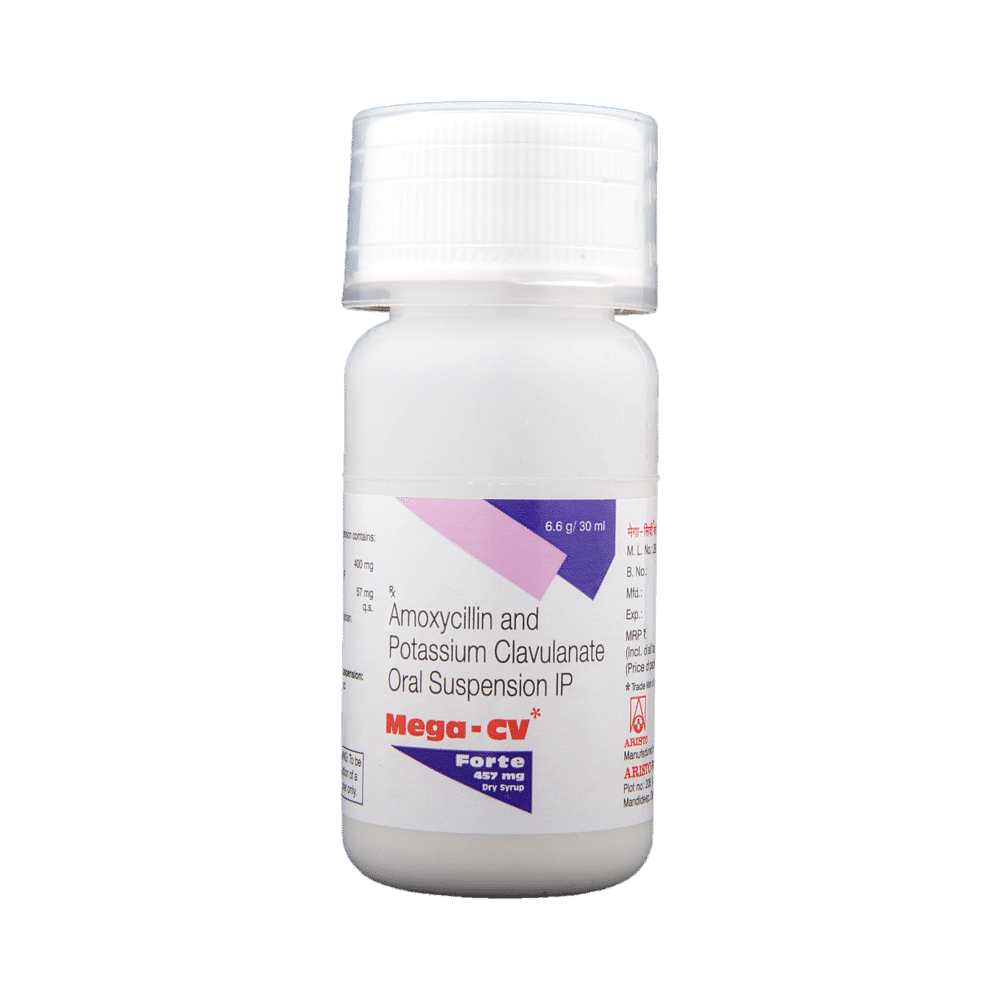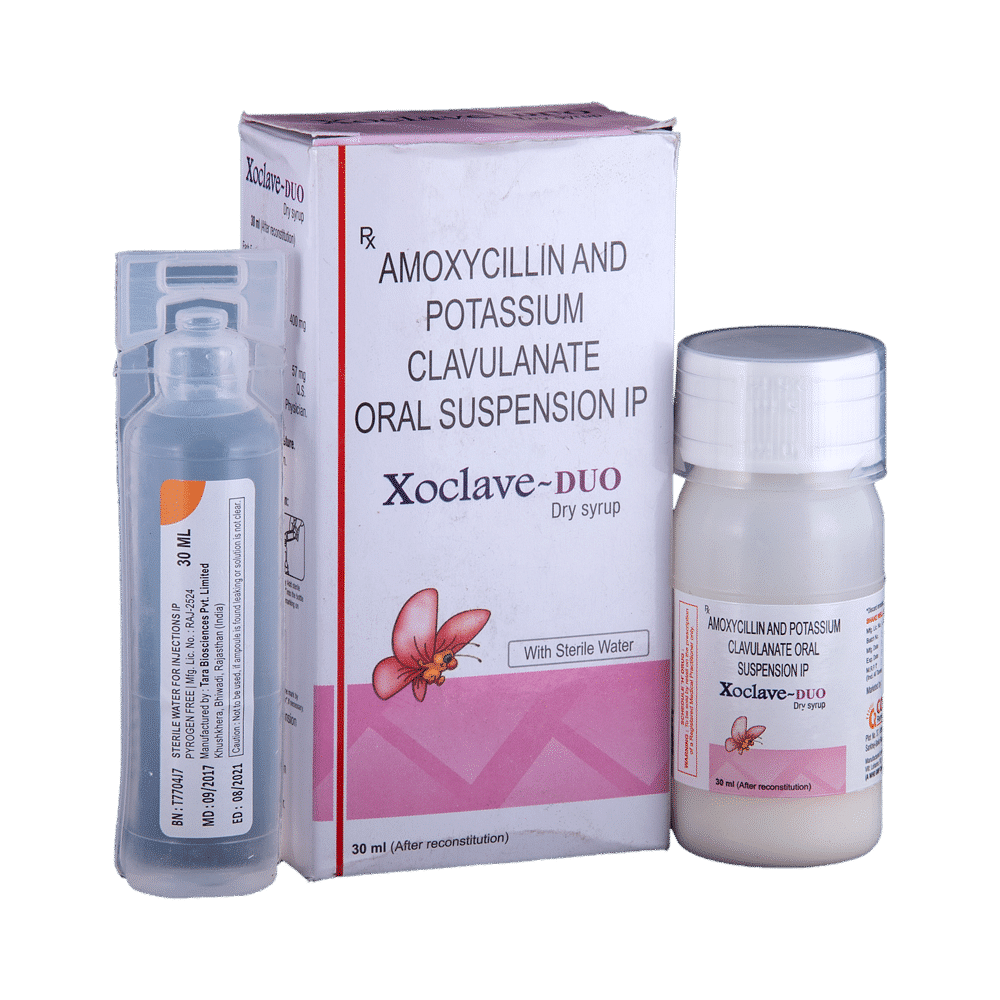
Yevoclav Plus Dry Syrup
Manufacturer
Glacia Life Care
Salt Composition
Amoxycillin (400mg/5ml) + Clavulanic Acid (57mg/5ml)
Key Information
Short Description
Yevoclav Plus Dry Syrup is an antibiotic medicine that helps treat bacterial infections of the ear, nose, throat, chest, lungs, teeth, skin, and urinary tract.
Dosage Form
Dry Syrup
Introduction
Yevoclav Plus Dry Syrup is an antibiotic medicine that helps treat bacterial infections of the ear, nose, throat, chest, lungs, teeth, skin, and urinary tract. It is capable of killing bacteria that have become resistant to other therapies and thus also helps treat tuberculosis that is resistant to other treatments.
Directions for Use
Never give Yevoclav Plus Dry Syrup until and unless prescribed by the doctor. You must also never share your child’s medicine with anyone else even if they show similar symptoms.
Safety Information
Side Effects
No common side effects listed.
How it works
Yevoclav Plus Dry Syrup is an antibiotic. It has two active agents amoxycillin and clavulanic acid. Amoxycillin works by preventing the formation of the bacterial protective covering (cell wall) essential for the survival of the bacteria. Whereas clavulanic acid serves a special purpose of inhibiting an enzyme (beta-lactamase) that is produced by resistant bacteria. This makes the combination of amoxycillin and clavulanic acid an effective line of treatment for many types of infections.
Quick Tips
Never give Yevoclav Plus Dry Syrup to treat common cold and flu-like symptoms caused by viruses. Never save medicine for future illnesses. It cannot be said whether the same medicine will work on future infections. Check ‘expiry’ before giving Yevoclav Plus Dry Syrup to your child. Immediately discard all the expired medicines. Stop Yevoclav Plus Dry Syrup immediately if your child develops an itchy rash facial swelling or breathing difficulty. Report to the doctor without any delay.
Related Medicines

Clavam Forte Dry Syrup

Mega-CV Forte 457mg Oral Suspension

Moxbio CV Forte Dry Syrup

Agunex CV DS Dry Syrup

Masterclav Forte Dry Syrup

Amoxytill CV Dry Syrup

Omclav Duo Dry Syrup

Kritmox CV Forte Dry Syrup

Xoclave -Duo Dry Syrup

Selluxy Forte Dry Syrup
Frequently asked questions
Can other medicines be given at the same time as Yevoclav Plus Dry Syrup?
Yevoclav Plus Dry Syrup may interact with other medications or substances. It's crucial to inform your child's doctor about all other medications they are taking before starting Yevoclav Plus Dry Syrup. Always check with your child's doctor before administering any medicine to your child.
Can I get my child vaccinated while on treatment with Yevoclav Plus Dry Syrup?
Antibiotics typically do not interfere with vaccines or cause adverse reactions in children after vaccination. However, it's recommended to avoid vaccinations until the child has recovered from any illnesses they might be experiencing. Once the child feels better, the vaccine can be administered.
Which lab tests may my child undergo while taking Yevoclav Plus Dry Syrup on a long-term basis?
During prolonged therapy, your doctor might periodically monitor kidney and liver function tests to assess your child's condition.
Can I give a higher than the recommended dose of Yevoclav Plus Dry Syrup to my child?
Giving a higher than recommended dose of this medicine can increase risks of side effects. If your child experiences increased severity of symptoms, consult your doctor for re-evaluation.
Can I stop giving Yevoclav Plus Dry Syrup to my child when the symptoms are relieved?
No, do not stop giving this medicine to your child unless you complete the entire course of treatment. Even if they feel better, symptoms may improve before the infection is fully cured. Therefore, continue administering the medication as prescribed for the full duration.
Can the use of Yevoclav Plus Dry Syrup cause diarrhea?
Yes, Yevoclav Plus Dry Syrup can potentially cause diarrhea. It's important to remember that this medication is an antibiotic designed to kill harmful bacteria. Additionally, it may affect the beneficial bacteria in your child's stomach and lead to diarrhea. Encourage your child to drink plenty of water or other fluids if they experience diarrhea. Consult your doctor if diarrhea persists and observe for signs of dehydration such as infrequent urination with dark-colored and strong-smelling urine. Do not administer any other medication without consulting your doctor.
Do all viral common colds result in secondary bacterial infection?
Viruses usually cause common colds, but not all cases will necessarily lead to bacterial infections. In most instances, antibiotic use is not necessary for treating the common cold, as these infections resolve with time and self-care.
The mucus coming out of my child’s nose is yellow-green. Is it a sign of a bacterial infection?
Yellow or green mucus in the nose doesn't automatically indicate a bacterial infection, especially during common colds. The appearance of mucus may change from clear to yellow or green as your child's immune system fights off the virus. Symptoms typically last for 7-10 days.
Is there any sign which shows that my child needs immediate medical attention?
Seek medical attention immediately if your child experiences severe allergic reactions (breathing difficulties, skin rashes), gastrointestinal problems (diarrhea), or liver damage (weakness, paleness, vomiting). These are rare side effects but require urgent medical intervention.


